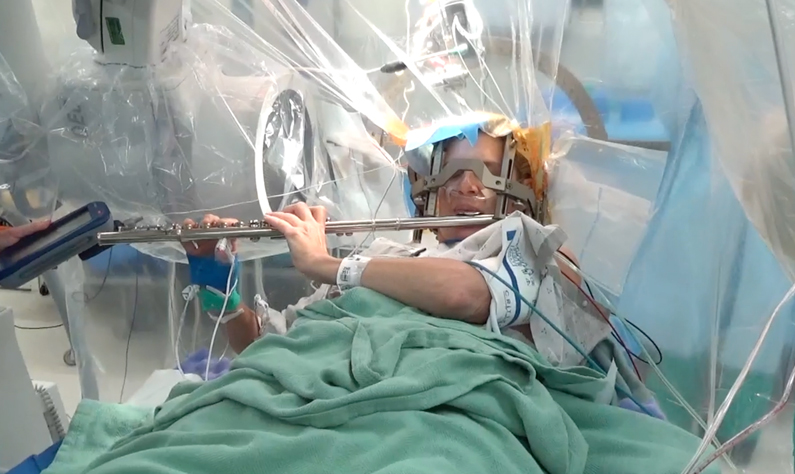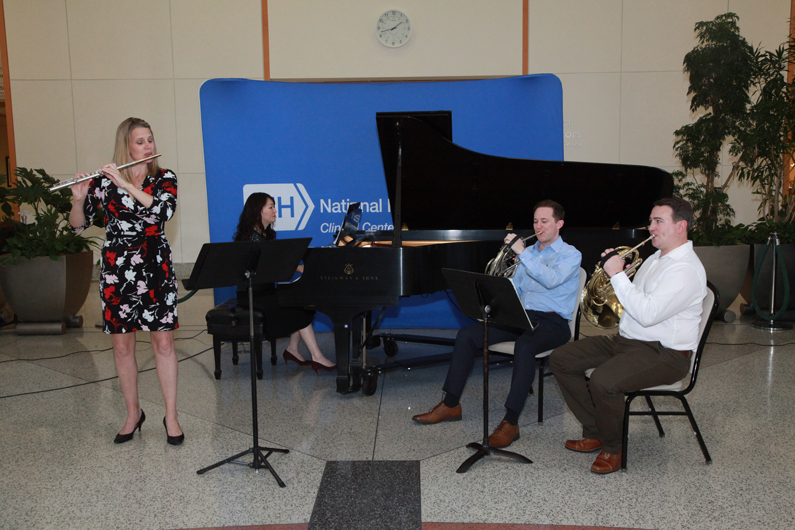Content on this webpage is provided for historical information about the NIH Clinical Center. Content is not updated after the listed publication date and may include information about programs or activities that have since been discontinued.


Many patients look for ways to "give back" to NIH for providing hope, but for Julianna Nickel, she is sharing the very thing that NIH returned to her — the ability to play the flute.
Nickel's condition, called Focal Dystonia, is a rare condition that is task-specific; it only affects her when she plays the flute. It is a neurological condition that took a while for doctors to diagnose.
The standard treatment was botulinum toxin (e.g. Botox) injections, which helped to a certain extent, though not fully. Through a physician friend, she heard about a study on Parkinson's, which sent her on a Google search, ultimately leading to the discovery of the NIH clinical trial trying a new treatment – DBS, or deep brain stimulation. This study targeted patients who didn't respond to botulinum toxin injections. She decided to enroll.
In 2017, Nickel met with Dr. Debra Ehrlich, chief of the Parkinson's disease Clinic with the NIH National Institute of Neurological Disorders and Stroke (NINDS), and the Movement Disorders team at NIH. She started the process of testing and answering questionnaires.
Finally, she and her husband, who is a horn player with the National Symphony Orchestra, met with the neurosurgery team to finalize plans. This was the first time surgery of this kind has been used to treat Focal Hand Dystonia in musicians. According to Ehrlich, DBS has been quite successful in patients with other neurological conditions such as Parkinson's and essential tremor. But not for Focal Dystonia. What's more-Nickel needed to be awake and play her flute during the invasive surgery.
Nickel says, "The more we met with the doctors and nurses, the more convinced I became that they were the best. So I was comfortable with this surgery."
The surgery involved creating a small hole in the skull and passing a DBS electrode into a specific location in her brain. A battery was then inserted into her chest under the skin. Similar to a pacemaker, electrical signals are sent from the battery to the electrode. During the procedure, Nickel played scales and songs from the operating room table while the team tested the electrode. The OR team was excited to see improvements in her finger movements when they provided test stimulation through the electrode. The stimulator was then turned off and her brain was given time to heal.
A month after surgery, Ehrlich turned on the stimulator. She needed to adjust the amount of voltage, pulse-width and frequency to have the best effect. At each visit, further changes were made to the stimulation parameters in an attempt to optimize the benefit.
Ehrlich reports that Nickel was very patient throughout the study. "Her persistence speaks to how important music is to her," she said. Although finding the best setting for the stimulator is ongoing, the surgery, along with occasional Botox injections, has allowed Nickels to play the best she has ever played.
Currently, she is the Adjunct Professor of Flute at George Mason University and is a two-time recipient of Mason's Distinguished Teacher of the Year (2019, 2017). She also freelances as a chamber musician and is a guest performer for the National Symphony Orchestra (NSO) Chamber Groups at the Millennium Stage at the Kennedy Center and Music in the Atrium concerts at the NIH Clinical Center Atrium. So when Nickel performs with an NSO group at NIH, it is a very unique connection.
She says, "I get to come back and do what I do as a living, knowing what it's like to be a patient, and to put your trust in the nurses and doctors here."
Readers may find more info at her Facebook page "Julianna's Journey: flute, focal dystonia, and surgery" https://www.facebook.com/julinickelflute/ https://www.julinickel.com/blog
- Debbie Accame

